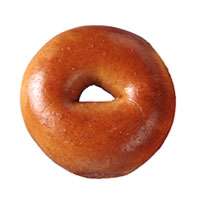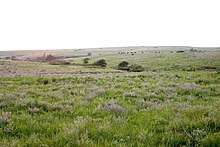plain
English
Pronunciation
- enPR: plān, IPA(key): /pleɪn/
Audio (US) (file) - Rhymes: -eɪn
- Homophone: plane
Etymology 1
From Middle English pleyn, borrowed from Anglo-Norman pleyn, playn, borrowed from Middle French plain, plein, from Old French plain, from Latin plānus (“flat, even, level, plain”).
Adjective

plain (comparative plainer, superlative plainest)
- (now rare, regional) Flat, level. [from 14th c.]
- Bible, Isaiah xl. 4
- The crooked shall be made straight, and the rough places plain.
- Bible, Isaiah xl. 4
- Simple.
- Ordinary; lacking adornment or ornamentation; unembellished. [from 14th c.]
- He was dressed simply in plain black clothes.
- a plain tune
- 2013 September-October, Henry Petroski, “The Evolution of Eyeglasses”, in American Scientist:
- The ability of a segment of a glass sphere to magnify whatever is placed before it was known around the year 1000, when the spherical segment was called a reading stone, essentially what today we might term a frameless magnifying glass or plain glass paperweight.
- Of just one colour; lacking a pattern.
- a plain pink polycotton skirt
- Simple in habits or qualities; unsophisticated, not exceptional, ordinary. [from 16th c.]
- They're just plain people like you or me.
- (Can we date this quote?) Henry Hammond
- plain yet pious Christians
- (Can we date this quote?) Abraham Lincoln
- the plain people
- (of food) Having only few ingredients, or no additional ingredients or seasonings; not elaborate, without toppings or extras. [from 17th c.]
- Would you like a poppy bagel or a plain bagel?
- (computing) Containing no extended or nonprinting characters (especially in plain text). [from 20th c.]
- Ordinary; lacking adornment or ornamentation; unembellished. [from 14th c.]
- Obvious.
- Evident to one's senses or reason; manifest, clear, unmistakable. [from 14th c.]
- 1843, Thomas Carlyle, Past and Present, book 2, ch. XV, Practical — Devotional
- In fact, by excommunication or persuasion, by impetuosity of driving or adroitness in leading, this Abbot, it is now becoming plain everywhere, is a man that generally remains master at last.
- 1843, Thomas Carlyle, Past and Present, book 2, ch. XV, Practical — Devotional
- Downright; total, unmistakable (as intensifier). [from 14th c.]
- His answer was just plain nonsense.
- Evident to one's senses or reason; manifest, clear, unmistakable. [from 14th c.]
- Open.
- Honest and without deception; candid, open; blunt. [from 14th c.]
- Let me be plain with you: I don't like her.
- 1577, Socrates Scholasticus [i.e., Socrates of Constantinople], “Constantinus the Emperour Summoneth the Nicene Councell, it was Held at Nicæa a Citie of Bythnia for the Debatinge of the Controuersie about the Feast of Easter, and the Rootinge out of the Heresie of Arius”, in Eusebius Pamphilus; Socrates Scholasticus; Evagrius Scholasticus; Dorotheus; Meredith Hanmer, transl., The Avncient Ecclesiasticall Histories of the First Six Hundred Yeares after Christ, Wrytten in the Greeke Tongue by Three Learned Historiographers, Eusebius, Socrates, and Euagrius. [...], book I (The First Booke of the Ecclesiasticall Historye of Socrates Scholasticvs), imprinted at London: By Thomas Vautroullier dwelling in the Blackefriers by Ludgate, OCLC 55193813, page 225:
- [VV]e are able with playne demonſtration to proue, and vvith reaſon to perſvvade that in tymes paſt our fayth vvas alike, that then vve preached thinges correſpondent vnto the forme of faith already published of vs, ſo that none in this behalfe can repyne or gaynesay vs.
- (Can we date this quote?) William Shakespeare
- an honest mind, and plain
- 1749, Henry Fielding, The History of Tom Jones, a Foundling. In Six Volumes, volume (please specify |volume=I to VI), London: Printed by A[ndrew] Millar, […], OCLC 928184292:
- The Quaker was no sooner assured by this fellow of the birth and low fortune of Jones, than all compassion for him vanished; and the honest plain man went home fired with no less indignation than a duke would have felt at receiving an affront from such a person.
- Clear; unencumbered; equal; fair.
- (Can we date this quote?) Felton
- Our troops beat an army in plain fight.
- (Can we date this quote?) Felton
- Honest and without deception; candid, open; blunt. [from 14th c.]
- Not unusually beautiful; unattractive. [from 17th c.]
- 1986, John le Carré, A Perfect Spy:
- Yet her beauty clung to her like an identity she was trying to deny and her plainness kept slipping like a bad disguise.
- Throughout high school she worried that she had a rather plain face.
-
- (card games) Not a trump.
Synonyms
Antonyms
Derived terms
- plain and simple
- plain as a pikestaff
- plain as the nose on one's face
- plain chocolate
- plain clothes
- plain-dealing
- plain Dunstable
- plain film
- plain flour
- plain-hearted
- plain Jane
- plain-laid
- plain line
- plain paper
- plain point
- plain sailing
- plain song/plainsong
- plain-spoken
- plain text
- plain-vanilla
- plain weave
- plain-winged
- plainly
- plainness
Translations
|
|
|
|
Adverb
plain (not comparable)
- (colloquial) Simply.
- It was just plain stupid.
- I plain forgot.
- (archaic) Plainly; distinctly.
- Tell me plain: do you love me or no?
Etymology 2
From Anglo-Norman plainer, pleiner, variant of Anglo-Norman and Old French pleindre, plaindre, from Latin plangere, present active infinitive of plangō.
Alternative forms
Noun
plain (plural plains)
- (rare, poetic) A lamentation.
- 1815, Sir Walter Scott, The Lady of the Isles, Canto IV, part IX
- The warrior-threat, the infant's plain,
- The mother's screams, were heard in vain;
- 1815, Sir Walter Scott, The Lady of the Isles, Canto IV, part IX
Verb
plain (third-person singular simple present plains, present participle plaining, simple past and past participle plained)
- (reflexive, obsolete) To complain. [13th-19th c.]
- c. 1390, William Landland, Piers Plowman, Prologue:
- Persones and parisch prestes · pleyned hem to þe bischop / Þat here parisshes were pore · sith þe pestilence tyme […].
- c. 1390, William Landland, Piers Plowman, Prologue:
- (transitive, intransitive, now rare, poetic) To lament, bewail. [from 14th c.]
- to plain a loss
- (Can we find and add a quotation of Sir J. Harrington to this entry?)
- (Can we date this quote?) Bishop Joseph Hall
- Thy mother could thee for thy cradle set / Her husband's rusty iron corselet; / Whose jargling sound might rock her babe to rest, / That never plain'd of his uneasy nest.
- (Can we date this quote?) Alfred Edward Housman, More Poems, XXV, lines 5-9
- Then came I crying, and to-day, / With heavier cause to plain, / Depart I into death away, / Not to be born again.
Etymology 3
From Old French plain, from Latin plānum (“level ground, a plain”), neuter substantive from plānus (“level, even, flat”).
Noun

plain (plural plains)
- An expanse of land with relatively low relief, usually exclusive of forests, deserts, and wastelands.
- (Can we date this quote?) John Milton
- Him the Ammonite / Worshipped in Rabba and her watery plain.
- 1961, J. A. Philip. Mimesis in the Sophistês of Plato. In: Proceedings and Transactions of the American Philological Association 92. p. 467.
- For Plato the life of the philosopher is a life of struggle towards the goal of knowledge, towards “searching the heavens and measuring the plains, in all places seeking the nature of everything as a whole”
- (Can we date this quote?) John Milton
- (archaic) Synonym of field in reference to a battlefield.
- (Can we find and add a quotation of Arbuthnot to this entry?)
- (Can we date this quote?) Shakespeare
- Lead forth my soldiers to the plain.
- (obsolete) Alternative spelling of plane: a flat geometric field.
Usage notes
Synonyms
- (flat land): plains, flatland, flatlands, grassland, grasslands
Derived terms
- abyssal plain
- alluvial plain
- flood plain, floodplain
- gibber plain
- Great Plains
- peneplain
- Plains
- plain wanderer
- salt plain
- the rain in Spain falls mainly in the plain
- White Plains
Translations
|
|
Verb
plain (third-person singular simple present plains, present participle plaining, simple past and past participle plained)
- (obsolete, transitive) To level; to raze; to make plain or even on the surface.
- 1594, Christopher Marlowe, Edward II, London: William Jones,
- Frownst thou thereat aspiring Lancaster,
- The sworde shall plane the furrowes of thy browes,
- 1612, George Wither, Prince Henrie’s Obsequies, Elegy 24, in Egerton Brydges (editor), Restituta, Volume I, London: Longman, Hurst, Rees, Orme & Brown, 1814, p. 399,
- Though kept by Rome’s and Mahomet’s chiefe powers;
- They should not long detain him there in thrall:
- We would rake Europe rather, plain the East;
- Dispeople the whole Earth before the doome:
- 1594, Christopher Marlowe, Edward II, London: William Jones,
- (obsolete, transitive) To make plain or manifest; to explain.
- c. 1608, William Shakespeare, Pericles, Act III, Prologue,
- What’s dumb in show, I’ll plain with speech.
- c. 1608, William Shakespeare, Pericles, Act III, Prologue,
Dalmatian
French
Adjective
plain (feminine singular plaine, masculine plural plains, feminine plural plaines)
- (obsolete) plane
Further reading
- “plain” in le Trésor de la langue française informatisé (The Digitized Treasury of the French Language).
Middle French
Etymology
From Old French plain, from Latin plēnus.
Old French
Adjective
plain m (feminine plaine)
- full (not empty)
- circa 1170, Chrétien de Troyes, Érec et Énide:
- De tant come ele l'ot veü,
- Que plains estoit de felenie.
- As she had seen
- He was full of evil
- circa 1170, Chrétien de Troyes, Érec et Énide:
Antonyms
- (full): vuit
Descendants
- French: plein
Etymology 2
From Latin plānum (“level ground, a plain”), neuter substantive from plānus (“level, even, flat”).
Noun
plain m (oblique plural plainz, nominative singular plainz, nominative plural plain)
- plain (flat area)